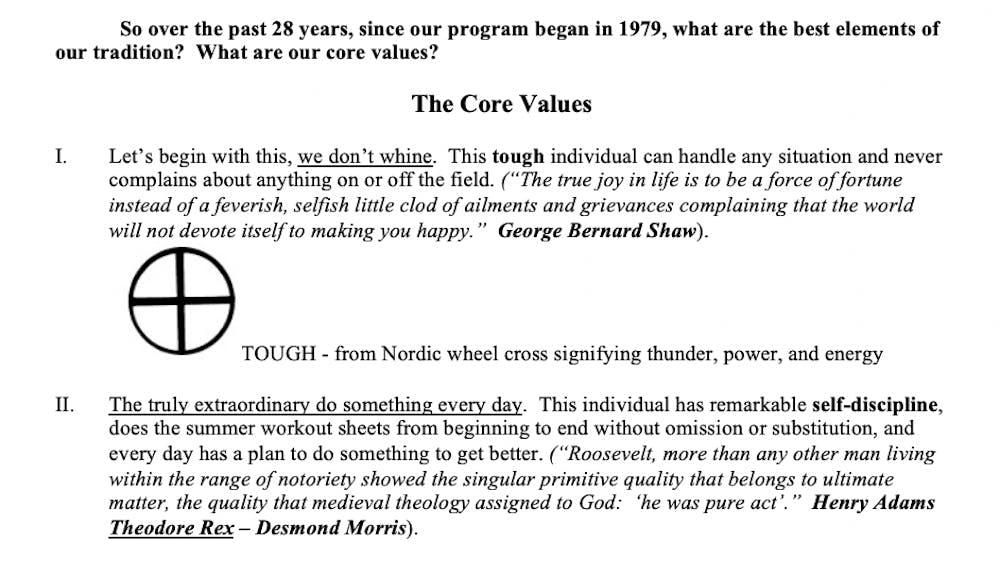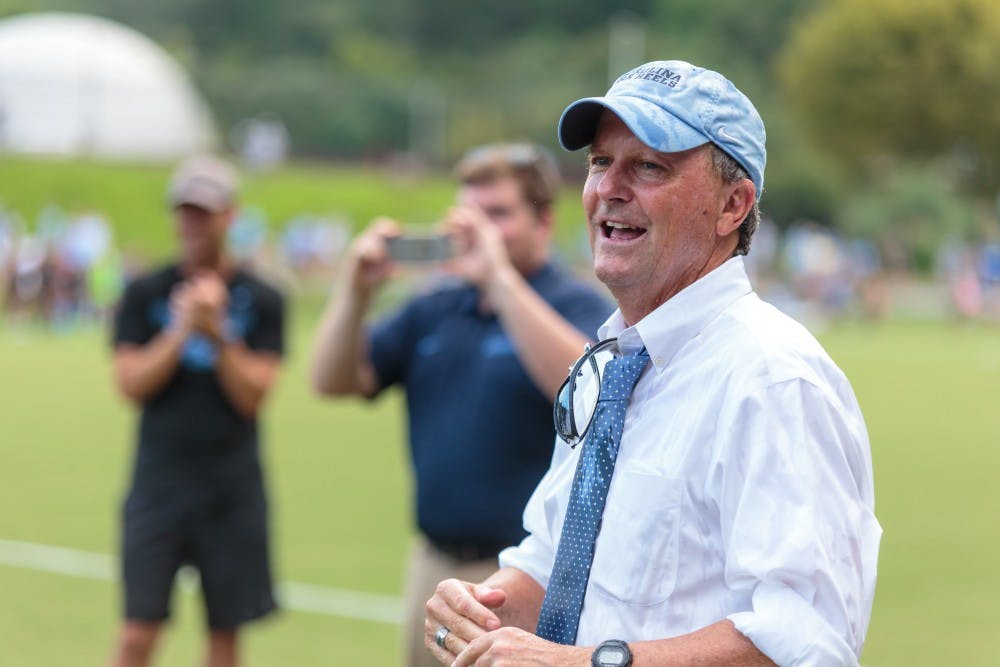We have all of our girls memorize quotes attached to each core value, and we expect them to live them. Then we have each girl evaluate each girl against them. They not only have to understand what our core values are; we want them to live by our core values.
DTH: In the book, one of the things you talk about is how excellence is actually mundane. Can you explain that idea?
AD: Actually, I got it from a UNC professor, Howard Aldrich. He uses Chambliss’ description of how people become extraordinary in swimming. What he talks about – and it’s an analogy not just for swimming, but for anything – is to be excellent in anything is actually mundane. It’s basically about grinding. It’s about putting more quality time into that exercise, or that discipline, than anyone else is putting in.
And that’s the way you become extraordinary. So it’s a question of commitment, time, intensity and focus. It’s not, like, a trick. It’s not like these people are extraordinarily talented, they’re just incredibly hardworking and disciplined, and committed to whatever their craft is. There’s nothing complex about excellence.
DTH: Absolutely. So September will be 41 years coaching UNC women’s soccer for you. I know you’ve said before that you’d like to die on the field. Is that still how you feel?
AD: Well yeah, but for me, obviously, that’s humor. I'd rather die in the arms of my loving family. But it’s more fun to die on the field right after you’ve beaten Duke to death, just because of the humor. But yeah, I love coaching, and one day, obviously, it’s going to end. I probably would not die on the field, but I have no issue with doing it that way, because that would certainly be a glorious way to go. There are a lot of worse ways to go.
DTH: But you’re still passionate about it?
I love it. That is the indirect point, is that I absolutely love it.
DTH: Forty years of women’s soccer, and UNC men’s soccer before that – how do you think you’ve changed personally as a coach during that time?
AD: As anyone in the coaching profession will tell you, you’re always going to be evolving in the game. So I’m continuing to learn, and the game continues to evolve, so you have to continue to change to stay caught up.
Which is another reason why I’m looking forward to this World Cup. A lot of people are asking me, “Anson, are you going to France?” No. I can’t imagine a worse way to study the World Cup than by going. Then I spend half my time trying to figure out where the stadium is, trying to find a place to park, walking to the stadium, getting lost trying to find my seat, then missing four or five games. I’m gonna sit on my couch and watch every friggin’ game.
I’m not just a fan of the game. I’m a student of the game, so to be an effective student I have to watch every game. For me, I’ve got all these different curiosities, and the best way to study this is not to go, but to stay here and watch every game.
To get the day's news and headlines in your inbox each morning, sign up for our email newsletters.
DTH: When you’re studying the game, are you watching it one time, or are you going back and breaking down the film – rewinding, that kind of thing?
AD: I am rewinding – I’m probably not breaking down the film. I am developing opinions on every match, then obviously reading the opinions of other experts. I’m also listening to the color commentators to see if they reflect my views, and if they don’t I want to see why they’re saying that and I’m thinking something else. There will be books written about this event, especially if we win or if a dark horse wins.
But I’m also not naive; some games can turn on good luck and bad luck. There are a lot of things that can happen in a game where the inferior team can win, or the superior team can have some bad luck with an injury or something else and lose a game. There are a lot of different things we can look at in this event to study where our game is, where the rest of the world is, and come out of this thing being a better educated coach.
DTH: You have five former players on this year’s World Cup team. Generally speaking, when that kind of talent comes to your program, do you always know it immediately, or does it take a while for those people to develop?
AD: Here’s what you know: you know what their talent level is. But as I mentioned earlier, talent is overrated, which is why excellence is mundane. The excuse that a lot of people would love to give for why that person is such an incredible performer on the piano (for example): “Oh gosh, the talent of this person is extraordinary.”
When you start using statements like that and attributing it to talent, it’s a narrative to protect you from the fact that you haven’t done anything. For anyone that’s achieved anything, work has gotten them there. We try to recruit incredible talent, but they don’t always make it. So there are other factors involved.
DTH: What do you expect from (former Tar Heel) Tobin Heath in this World Cup?
AD: She can be a game changer. She has this incredible capacity to beat people off the dribble, and she’s wonderfully creative. She’s immensely entertaining, and her skill set is extraordinary. She could be the margin of victory for the United States. She has the ability to score goals, but also create goals. She’ll also fight like hell, she will compete the whole time and she could end up having an extraordinary World Cup.
DTH: What about Crystal Dunn?
AD: Crystal Dunn, like Tobin, will start for the United States. Her best quality is her ability to beat people off the dribble. She could be a devastating attacking outside back. She also needs to have a good World Cup defensively because right now, if there’s any criticism of the United States, it’s the defense.
DTH: Last question: your prediction for the World Cup? I’m sure you expect the U.S. to go back-to-back.
AD: Yeah, I think the U.S. will win, but I think Germany’s got a shot, I think England has a shot. I think the best chance of an upset might be France in the second round after group play. We will have no issue with our group – I think we’ll walk through it, it’s a relatively easy group. The only challenge in that group is Sweden. If we get through France (after group play), I think the betting odds in Vegas would change, and it would skyrocket for the United States.
It’s going to be an eye-opening World Cup. I can’t wait.
@ryantwilcox
@DTHSports | sports@dailytarheel.com




